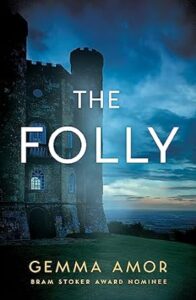I’ve always struggled with some of the prevailing definitions of ‘gothic’ fiction. Tradition dictates there should be elements of fear, threat, woe, that hauntings should occur and vile things must transpire. Gloominess and atmosphere are everything: crumbling castles (gothic architecture inhabits many gothic novels, see Thornfield, Manderlay, High Place, the castle of Otranto), windswept coastlines, damp woodlands…these admittedly comforting settings (comforting for unkempt, aspiring bog witches like me who nurture dreams of living out her advancing years in a crumbling hunting lodge with an enormous fireplace surrounded by snoring greyhounds deep in a dark forest firmly removed from all polite society) speak heavily of convention, which is perhaps apt in that gothic fiction often employs the device of the past intruding upon, and impacting the present. I am always wary, however, of traditionalism, especially when there are so many exciting, more modern tales available that fit firmly into the gothic school, in my opinion.
Beloved by Toni Morisson is one such novel for me. Set immediately after the American Civil War, in a haunted, lonely house at the end of a street with no other houses around: 124 Bluestone Road. As with many gothic novels, this house has a personality of its own, and its specific moods are a perfect stage upon which to set various family dramas, high passions, hidden secrets, traumatic remembrances and mysterious deaths, not to mention an exploration of the distressing pressures of motherhood (‘thin love ain’t love at all’), collective family trauma in the wake of escaping a life of slavery, complicated masculinity, madness, guilt, oppression…Beloved has it all, written in such a compelling, poetic yet upsetting way that sometimes the dissonance between the writing and subject matter (there are some graphic, raw descriptions of abuse) take a bit of adjusting to. Books don’t have to be easy, however, to be beautiful. It may well break your heart, and that is the sort of reading experience I seek whenever possible.
I’m not shy about my love for The Bloody Chamber by Angela Carter, who for a while lived, studied and wrote in Bristol, where I live. A collection of short stories that are gothic retellings of classic fairytales and folklore, this book is steeped in sensual, colourful imagery delivered with great theatricality, lyrical prose and a strongly feminist bent. The titular story – a reworking of the legend of Bluebeard – has as firm a grip on me now as it did the first day I read it, not least because the virginal (and rather uninspiring) protagonist is rescued from the torture chamber of the evil Marquis to whom she has reluctantly wedded by her fierce, revolver-wielding mother who rides in at the last minute on a white horse: a wildly climactic and hugely satisfying ending that is not a subtle reclamation of the Knight in Shining Armour trope, but that’s what I love about Carter. She rejected subtlety, particularly in her choice of hero, making the mother a pivotal, primal beat in a story about the torture and subjugation of women. A choice I can get firmly behind.
Gothic maternity, or the matrophobic gothic, explores motherhood in a variety of ways, both the good and the bad, and the fear inherent in motherhood, whether it be the experience of the mother or of the child. These themes are beautifully sewn into The Haunting of Alejandra by V Castro, a tale of multi-generational trauma about Alejandra, a woman who enters therapy to uncover more about her familial history, and in doing so, encounters La Llorona, a vengeful (and murderous) spirit. Inheritance, identity, Mexican folklore, maternal rage and guilt combine in a heady mix that is as compelling as it is melancholic.
I consider gothic maternalism a natural progression of the ‘madwoman in the attic’ brand of gothicism – where female rage is confined to small, dusty roof spaces as per Jane Eyre, a novel I have enormously complex feelings about. Had Bertha not escaped her padded prison cell, set Thornfield Hall on fire, and jumped to her death (justice for Bertha), and had Rochester not committed bigamy and cared for her better – would she have experienced anything happier as a traditional wife and mother? It isn’t a huge stretch to imagine her up in that attic with an added dose of post-natal depression or postpartum psychosis, her outcome no less tragic. Bled of her fortune, ripped from her home in Jamaica, I’ve always had doubts as to how ‘mad’ she actually was, for Rochester proves himself cruel and selfish throughout the novel. For this reason I always pair a re-read of Jane Eyre with its firmly anti-colonial, feminist prequel Wide Sargasso Sea, where Jean Rhys gives a much needed voice to the abused Mrs Rochester.
There is a nice reworking of the madwoman in the attic trope – the entity in the basement – in The Graveyard Apartment by Mariko Koike, where a young family moves into an apartment block in the suburbs of Tokyo that overlooks a cemetery, only to find their new home is a vault of secrets and eerie occurrences. A dead bird, tunnels, affairs, dysfunctional relationships, complex family backstories and odd goings-on escalate to a contentious conclusion.
The Turn of the Screw by Henry James is a slow-burn ghost story with a similarly contentious ending that lingers like smoke, an unreliable narrative, literary jump scares galore, and yet another gothic mansion, Bly Manor. Are the ghosts real in this tale? What happened to the governess’s first ward? Is Miles really possessed? When I finish a story with more questions than I started, I consider it a job well done by the author.
I love being tantalised by possibility, which leads me to my final gothic recommendation: Rebecca, by Daphne DuMaurier. Famous for its opening line “Last night I dreamt I went to Manderly again” Rebecca is a coming of age story of patriarchy, sex, power, old money, privilege and matrimonial duty (covering up a murder for a husband who quite frankly doesn’t deserve either of his wives), with the gorgeously moody cornish coastline as a fitting backdrop to all that goes in at Manderlay. Whenever I put this novel down, I am always left with the question: what if the narrator had never met Max DeWinter? Who would be the mistress of Manderley, and how miserable would they have been?
***


















